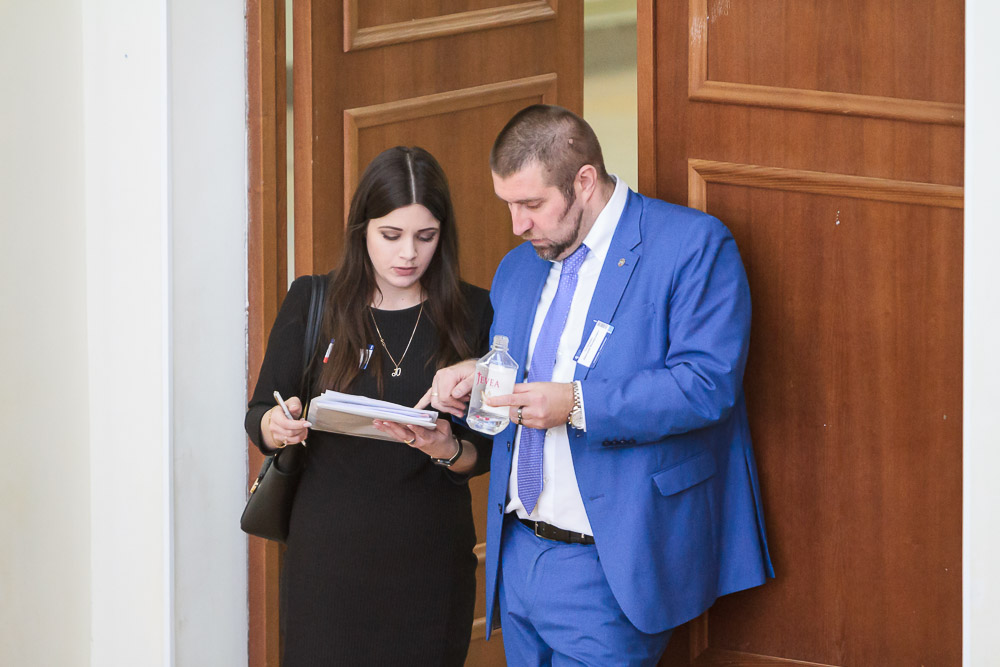
Published: March 30th, 2017
On March 30, within the framework of the Moscow Economic Forum (MEF), a conference "From financial strangulation to tax incentives: economic development in the face of growing pressure on business" was held. The moderators of the discussion were Vladislav Zhukovsky, Managing Director of Triumph Capital and Dmitry Potapenko, Managing Director of Management Development Group.
Opening the discussion, Vladislav Zhukovsky noted that the end of the crisis announced in 2015 turned into shocking economic indicators for February 2017. The economy is deteriorating, and attempts to embellish the current situation with statements of the Ministry of Economic Development discredit the authorities. The social consequences of the insolvency of the population are already evident, especially in the regions.
"The costs of business are growing, solvent demand is falling, getting into these fiscal, financial and monetary scissors, plus a stifling monetary policy and a completely paralyzed credit market. For three years, the drop in business lending was 20-25%, for small businesses it was up to 40%. It is impossible to get out of this crisis in the context of shrinking financial potential and a decline in the standard of living of the population, "stressed Zhukovsky.
Director of the agricultural enterprise "Galkinskoe" Vasily Melnichenko began with a statement: "There is no economy in Russia. There are economists and housekeepers sitting in the Central Bank, the Ministries and the Government and accustoming Russians to the fact that there is no money. «According to the businessman, the state does not fulfill the task of developing the territories and ensuring the prosperity of citizens. Now in Russia there is a formation of latifundia, the inevitable result of which will be the division of all lands between a small numbers of families. "This is a most dangerous trend, threatening access to land and energy resources. In such a situation, there cannot be business development" Melnichenko summed up. The speaker is convinced of the need for land reform and local government reform, which will allow the village to develop and provide the country with pro-independence independence.
Dmitry Alekseev, president of the DNS Company, identified three main, most acute problems: paternalism, grayness and the black economy, and lack of capital. He is convinced that the current economic situation requires more activity of the entrepreneurs themselves, and one cannot rely only on the change of power and regulation. The domestic economy is no longer in isolation, and the goods produced must be competitive not only in quality, but in price.
Dmitry Potapenko noted that the normative pressure on business is not compared to arbitrariness in the sphere of law enforcement. The number of criminal cases against businessmen is growing, but there is no question of transparency. "Paying taxes and running a transparent business has nothing to do with whether you will be squeezed out of your property and business or not," the businessman said. He is convinced that society has the right to demand strict civil control of all civil servants. According to the speaker, entrepreneurs and economically active people create the country, while representatives of the state bodies are a system of distribution and oppression, both as a citizen in the first place and as an entrepreneur in particular in the current situation. The lawyer Ivan Mironov, citing a number of concrete examples of bankruptcy of business by the forces of a corrupt investigation, supported the point of view of Potapenko.
Financial analyst Vladimir Levchenko translated the discussion into the world economy and existing forecasts. He noted that the supposed cessation of population growth in the world, as well as the development of technologies and the slowdown of economic growth, would inevitably lead to a crisis of overproduction. In this situation, the Russian economy will face new challenges, to which it is not ready. In recent years, our country has fallen out of the international division of labor, as evidenced by the fall of the ruble, moreover, the extremely low level of health does not allow Russia to improve the quality of human capital. Meanwhile, healthcare and high technologies will ensure the future of the planet.
According to most speakers, a constructive and transparent business dialogue with the authorities now in Russia is impossible. Develop the same real sector, and high-tech enterprises with the existing interest rate, the level of influence of banks and judicial arbitrariness - is a huge risk that the entrepreneur takes. Closing the session, Dmitry Potapenko wished the audience success in maintaining competition in such difficult conditions, and thanked the speakers for the discussion of important issues for the business in the framework of the Moscow Economic Forum.Latest news
07.05.2018 MEF-2018: debate "Cultural policy: between individual freedom and the interests of society?"
07.05.2018 MEF-2018: Conference No. 8
07.05.2018 MEF-2018: Conference No. 4
07.05.2018 MEF-2018: Conference No.3
07.05.2018 MEF-2018: Conference No. 2
07.05.2018 MEF-2018: Conference No.1
26.04.2018 McConnell Discusses Information Warfare
20.04.2018 MEF-2018: closing plenary session
17.04.2018 Mr. Freysinger: «Skripal’s case» for relationship between Russia und European Union?
